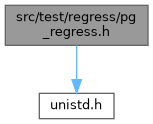#include <unistd.h>

Go to the source code of this file.
Data Structures | |
| struct | _stringlist |
Macros | |
| #define | PID_TYPE pid_t |
| #define | INVALID_PID (-1) |
Typedefs | |
| typedef struct _stringlist | _stringlist |
| typedef void(* | init_function) (int argc, char **argv) |
| typedef PID_TYPE(* | test_start_function) (const char *testname, _stringlist **resultfiles, _stringlist **expectfiles, _stringlist **tags) |
| typedef void(* | postprocess_result_function) (const char *filename) |
Functions | |
| int | regression_main (int argc, char *argv[], init_function ifunc, test_start_function startfunc, postprocess_result_function postfunc) |
| void | add_stringlist_item (_stringlist **listhead, const char *str) |
| PID_TYPE | spawn_process (const char *cmdline) |
| bool | file_exists (const char *file) |
Variables | |
| char * | bindir |
| char * | libdir |
| char * | datadir |
| char * | host_platform |
| _stringlist * | dblist |
| bool | debug |
| char * | inputdir |
| char * | outputdir |
| char * | expecteddir |
| char * | launcher |
| const char * | basic_diff_opts |
| const char * | pretty_diff_opts |
Macro Definition Documentation
◆ INVALID_PID
| #define INVALID_PID (-1) |
Definition at line 15 of file pg_regress.h.
◆ PID_TYPE
Definition at line 14 of file pg_regress.h.
Typedef Documentation
◆ _stringlist
| typedef struct _stringlist _stringlist |
◆ init_function
◆ postprocess_result_function
Definition at line 42 of file pg_regress.h.
◆ test_start_function
| typedef PID_TYPE(* test_start_function) (const char *testname, _stringlist **resultfiles, _stringlist **expectfiles, _stringlist **tags) |
Definition at line 36 of file pg_regress.h.
Function Documentation
◆ add_stringlist_item()
| void add_stringlist_item | ( | _stringlist ** | listhead, |
| const char * | str | ||
| ) |
Definition at line 197 of file pg_regress.c.
References fb(), pg_malloc_object, pg_strdup(), _stringlist::str, and str.
Referenced by regression_main(), and split_to_stringlist().
◆ file_exists()
Definition at line 1307 of file pg_regress.c.
References fb().
Referenced by isolation_start_test(), psql_start_test(), and results_differ().
◆ regression_main()
| int regression_main | ( | int | argc, |
| char * | argv[], | ||
| init_function | ifunc, | ||
| test_start_function | startfunc, | ||
| postprocess_result_function | postfunc | ||
| ) |
Definition at line 2069 of file pg_regress.c.
References add_stringlist_item(), appendStringInfo(), appendStringInfoString(), bail, bindir, buf, config_auth_datadir, create_database(), create_role(), StringInfoData::data, dblist, debug, diag, difffilename, directory_exists(), dlpath, drop_database_if_exists(), drop_role_if_exists(), encoding, expecteddir, extra_tests, extraroles, fail_count, fb(), file_size(), free_stringlist(), get_progname(), get_restricted_token(), getopt_long(), help(), hostname, i, initialize_environment(), initStringInfo(), inputdir, INVALID_PID, keywords, kill, launcher, loadextension, logfile, logfilename, make_absolute_path(), make_directory(), max_concurrent_tests, max_connections, MAXPGPATH, _stringlist::next, no_argument, nolocale, note, open_result_files(), optarg, optind, outputdir, pfree(), pg_log_error_hint, pg_logging_init(), pg_strdup(), PG_TEXTDOMAIN, pg_usleep(), plan, port, port_specified_by_user, portstr, postmaster_pid, postmaster_running, PQPING_NO_ATTEMPT, PQPING_OK, PQpingParams(), pretty_diff_opts, progname, required_argument, rmtree(), run_schedule(), run_single_test(), schedulelist, set_pglocale_pgservice(), setenv, SIGKILL, snprintf, sockdir, spawn_process(), split_to_stringlist(), sprintf, stop_postmaster(), _stringlist::str, success_count, temp_configs, temp_instance, true, ULONGPID, unlimit_core_size(), use_existing, user, values, wait_seconds, and WAIT_TICKS_PER_SECOND.
Referenced by main().
◆ spawn_process()
Definition at line 1204 of file pg_regress.c.
References bail, bail_noatexit, fb(), psprintf(), and shellprog.
Referenced by ecpg_start_test(), isolation_start_test(), psql_start_test(), and regression_main().
Variable Documentation
◆ basic_diff_opts
Definition at line 64 of file pg_regress.c.
Referenced by results_differ().
◆ bindir
|
extern |
Definition at line 102 of file pg_regress.c.
Referenced by psql_start_command(), psql_start_test(), regression_main(), and stop_postmaster().
◆ datadir
|
extern |
Referenced by check_data_directory(), extractPageMap(), findLastCheckpoint(), get_pg_version(), get_standby_sysid(), identify_target_directory(), init_local_source(), local_fetch_file(), local_queue_fetch_file(), local_queue_fetch_range(), local_traverse_files(), pid_lock_file_exists(), readOneRecord(), recurse_dir(), setup_recovery(), slurpFile(), stop_standby_server(), and traverse_datadir().
◆ dblist
|
extern |
Definition at line 97 of file pg_regress.c.
Referenced by do_start_worker(), get_database_list(), isolation_init(), isolation_start_test(), psql_init(), psql_start_test(), rebuild_database_list(), and regression_main().
◆ debug
|
extern |
Definition at line 98 of file pg_regress.c.
Referenced by regression_main().
◆ expecteddir
|
extern |
Definition at line 101 of file pg_regress.c.
Referenced by ecpg_start_test(), psql_start_test(), and regression_main().
◆ host_platform
|
extern |
Definition at line 52 of file pg_regress.c.
Referenced by load_resultmap().
◆ inputdir
|
extern |
Definition at line 99 of file pg_regress.c.
Referenced by ecpg_start_test(), initialize_environment(), isolation_start_test(), load_resultmap(), psql_start_test(), and regression_main().
◆ launcher
|
extern |
Definition at line 103 of file pg_regress.c.
Referenced by isolation_start_test(), psql_start_test(), and regression_main().
◆ libdir
|
extern |
◆ outputdir
|
extern |
Definition at line 100 of file pg_regress.c.
Referenced by ecpg_start_test(), initialize_environment(), isolation_start_test(), open_result_files(), psql_start_test(), and regression_main().
◆ pretty_diff_opts
Definition at line 65 of file pg_regress.c.
Referenced by regression_main(), and results_differ().